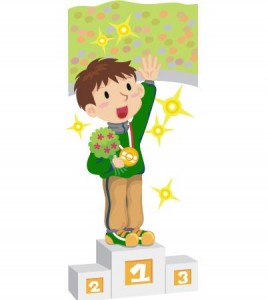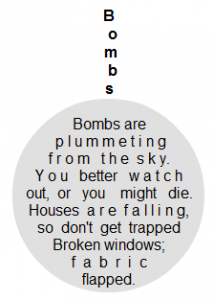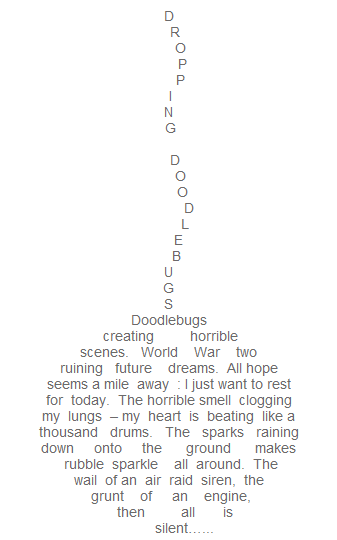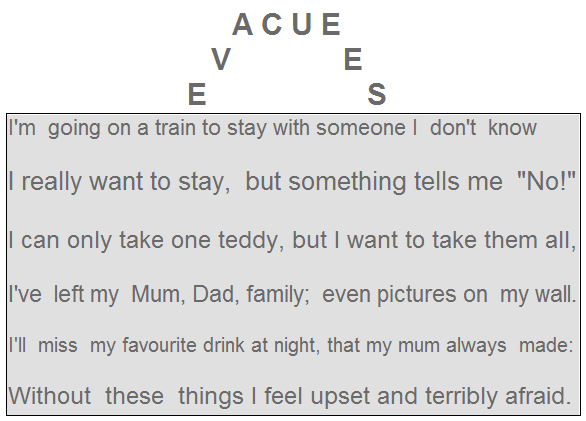Queen Primary School
Winning World War Two Poems by Queen Primary School
Having spent a fantastic morning doing a poetry workshop with a year 5 class of children, these were some of the children’s superb poems that I selected from a competition that we ran in class. You may guess that the topic that we focussed on was World War Two, and we looked at the feelings and the experiences of children in London during this time.
Whilst we had lots of fun playing with words, the children also learned lots of poetic techniques, and I am delighted with the attempts that they made to include interest and emotion, as well as alliteration (repeating initial letters.) Many CHOSE to include rhyme (this was not a requirement), whilst some chose specific poem forms, such as shape, acrostic or their own free style.
The children also very clearly illustrated my point that poetry can engage children in literacy, regardless of what level they are at.
WELL DONE TO THE WHOLE CLASS, choosing only a few for my site was very difficult.
| Kind Kate chose to do a rhyming poem, which I loved because of all the affection and emotion included. She has made us relate to the little details that are special (“Little Tommy” and his “lovely pictures.”) , which is a very important skill within poetry. Dad being sent off into the rain is a great line: we assume that he is going to war, as even the weather paints a sad image. Kate has also managed to make the poem rhyme (“same” and “rain” are called ‘half-rhymes’, or ‘near rhymes’)WELL DONE KATE! |
My Life in World War 2My Mum said “I’ll never forget The things that you do best Little Tommy, I’ll always love Your lovely pictures and all the rest.”My Dad said all the same Before he was sent off into the rain. My sister and brother were sent away I was evacuated on a train
|
|||
|
|
I love the way that Marvellous Maisie has even used the title to give movement and interest to this shape poem. She has included rhyme AND rhythm, as well as some superb metaphors: I’m sure that anyone who ever heard the whistle of a doodlebug falling and waited for the delay before it exploded could relate to the fear in the heart that she describes. I like the half rhyme in ‘siren’ and ‘silent’ that Maisie ends on: the ending leaves you with that feeling of holding your breath as it’s not yet over…..(great use of the dots, known as ‘an ellipsis’) WELL DONE MAISIE!
|
|||
| I love the fact that Bendy Becky has not just focussed on doing an acrostic poem but has made a real effort to include lots of alliteration in this, choosing her words very carefully (huge holes, burning buildings etc. ) I particularly like the rhyme and rhythm that she has given verse 2, and the similar way that she has rounded the poem up. WELL DONE REBECCA!
|
Life at War Walking through the dusty streets On the ground, huge holes in the mud Raining ashes from the sky Little children start to cry Down in the cities, burning buildings Worried families waiting for Dad. All of the people are worried and mad. Ready to fight, and all is sad. 2 many planes are filling the sky, hoping that they don’t get shot down and die.
|
|||
|
Evacuees |
||
|
We looked at my example shape poem like this in our workshop, so Kind Kiera has used this model, but added an extra personal feel to her poem. I love the detail of the personal importance of the drink that Mum makes, and the pictures that she has to leave behind; the struggle of choosing just one teddy; wanting to stay, but knowing deep down that it is better to go. All this depth of thought and emotion, and yet Kiera has also managed to make her shape poem rhyme, and have rhythm. Fantastic! WELL DONE KIERA!
|
||
| World War 2
Walking through the rubbled streets Over thick and thin Ready to run and hide away Living in the sorrow, starting from today Down in the big cities, bombs are Wooden sheds scattering splinters Aeroplanes all around coming down Right in front 2 many families die.
|
Special Shannon has worked really hard to include lots of alliteration in this acrostic poem. My favourite phrase is “Living in the sorrow”; it’s an excellent metaphor to express how constant and ever-present the feelings of the war were in everyone’s life. There are also the beginnings of some rhyming, but she has not allowed this to distract her from keeping the content of the poem to what is important; an excellent lesson to have learned at such a young age. WELL DONE SHANNON! |
|||
| Danny has made a particular effort here to use alliteration techniques which we practiced together: he has some assonance in ‘tummy’ and ‘rumble’ as well as it being a part of the rhyme, and some alliteration in the ‘sounds of sirens screeching’. I particularly like the way Danny has looked at the whole picture of how life affected everyone, even down to the attitude of the day “mustn’t grumble”. The rhymes are excellent and appropriate too. I’m so glad that you enjoyed this topic enough to do more poetry at home WELL DONE DANNY!
|
World War 2 World War Two is a really scary time Mum works on a farm, 7 days a week, from morning to night I’m so hungry that my little tummy starts to rumble, rumble, rumble The sounds of the sirens screeching around I pray Dad comes home all safe and well So for now I’ll keep writing to my Mum
|
|
The next challenge for you Danny is to attempt to make the rhythm consistent throughout the poem. You have achieved alliteration, rhyme and a good emotional and involved content to the poem, which is a brilliant beginning. Now we can take it to the next level, so don’t stop there; keep writing. |
If you’ve enjoyed reading the children’s world war two poems, why not read my own which I used to inspire them during the workshop. Click here to go to the World War Two topic poems




Comments on this entry are closed.